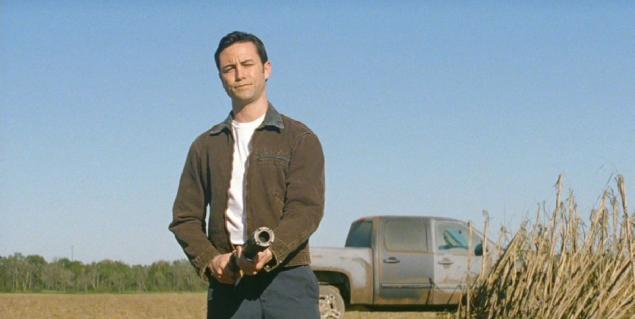Presenting reasonable, believable time travel in film is no easy task. Most efforts, like the “Terminator” franchise, are content to inform us that time travel exists, and then confine the action to one particular setting and time-stream for the sake of clarity. When filmmakers try to get creative, however, difficulties arise. Convolutions, like competing time-streams and the possibility of the new past changing the future, rarely serve the narrative, and must usually be handwaved down the memory hole. For every smart, well-planned creation (like the devilishly-clever, micro-budget “Primer”), there is a score of complete garbage (see the MST3K-featured “Time Chasers” or the soon-to-be-revisited “Bill & Ted” series).
So how does the latest entry in the genre, “Looper,” manage its temporal twists and turns? Quite well, as it turns out. “Looper” is the rare time travel film that cares as much about genuine storytelling as it does clever narrative enigmas. Despite an initially-flimsy premise, strong performances raise the film well above the typical genre standards.
It is 2044, three decades before the invention of time travel. Future criminal enterprises eliminate rivals by sending them back in time to be executed and disposed of by specialized assassins called ‘loopers.’ When a looper’s contract is up, he is paid handsomely and given one final mark: his future self. But when Joe (Joseph Gordon-Levitt) is assigned to “close his loop,” he is overpowered by his future self (Bruce Willis), who then escapes. In order to reclaim his next thirty years of life, Joe tries to track his older self down in order to finish the job, but when the two cross paths, Joe learns some startling facts behind the planned elimination of the loopers. With their employers seeking to execute them both, Joe tries to keep an innocent woman and her young son from being caught in the crossfire.
The production design is solid enough, combining elements of cyberpunk cityscapes, contemporary urban squalor, and timeless rural Americana. The futuristic visuals are far from breathtaking (don’t expect a style anywhere close to Gordon-Levitt’s last foray into sci-fi, 2010’s blockbuster “Inception“), and some cheesier elements (like an angular hoverbike) could have been trimmed, but they get the job done. Imagine the grunginess of “12 Monkeys” strained through the world of “Minority Report,” and you’ll have a good idea of what this world is like. It is just recognizable and relatable enough – despite some of the more transparent justifications for the use of time travel – that it provides an admissible setting.
This film succeeds, in large part, on the strength of its acting. Gordon-Levitt does quite well as the star, with a slightly-distracting prosthesis on the bridge of his nose allowing him to pass as a young Bruce Willis. Willis, for his part, is as stern and commanding as one can expect from a veteran actor of his stature. One terrific scene places the two of them together, having a heated discussion in a quiet diner. It’s no Pacino and De Niro over coffee in “Heat,” but it is highly entertaining. Both characters face some unorthodox moral dilemmas, and Willis and Gordon-Levitt do credible work to sell these struggles.
 Beyond those two, however, the real heart of the film is Emily Blunt as Sara, a young woman trying to do the right by her young son, Cid (a stunning performance from five-year-old Pierce Gagnon). Blunt shows us strength, vulnerability, and authentic maternal devotion in spades. Later scenes of Sara and Joe becoming close offer some genuine drama, more affecting than that of many non-genre films. The entire cast (including Jeff Daniels in a small supporting role) evince a rare devotion to character that is commendable.
Beyond those two, however, the real heart of the film is Emily Blunt as Sara, a young woman trying to do the right by her young son, Cid (a stunning performance from five-year-old Pierce Gagnon). Blunt shows us strength, vulnerability, and authentic maternal devotion in spades. Later scenes of Sara and Joe becoming close offer some genuine drama, more affecting than that of many non-genre films. The entire cast (including Jeff Daniels in a small supporting role) evince a rare devotion to character that is commendable.
“Looper” works, at bottom, because it is first and foremost a human story, and one that would be relatable and compelling in any era. The futuristic setting and time travel conventions do figure heavily into the plot, but they always add to the drama, instead of distracting from it. Writer/director Rian Johnson (best known for the unorthodox 2005 neo-noir, “Brick”) has managed to achieve a fine balance of action and storytelling. While some violence may make it unsuitable for young viewers, “Looper” is easy to recommend for just about everyone else
– by Demian Morrisroe



